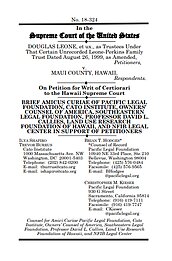Learn more about Cato’s Amicus Briefs Program.
The Fifth Amendment to the Constitution states that the government may not take private property for public use without just compensation. In 1992, in Lucas v. South Carolina Coastal Council, the Supreme Court found that regulations which render a parcel of land “valueless” are takings under the Fifth Amendment. Specifically, the Court said, a taking occurs when a “regulation denies all economically beneficial or productive use of land.” Yet the meaning of “valueless” is unclear (is an old clunker “valueless” if it gets you to work but can’t be sold for anything?), and it’s only complicated by the vagueness of the phrase “economically beneficial or productive use.” Consequently, since that decision, federal courts and state courts have been divided about distinction between value and use.
It is in that divide that Douglas and Patricia Leone find themselves. In 2000, the Leones purchased a plot of land on the island of Maui, Hawaii. They, like others in the area, bought the property for the express purpose of building a single-family home. But the Maui County government’s plan called for a park on the lot and they subsequently denied the Leones their building permit. Recognizing that their land was no longer of viable economic use to them, the Leones sued. They argued that, by prohibiting their building project in favor of keeping the lot empty for the park, the government had taken their land for public use without compensation.
A jury rejected that argument. While the county had indeed prohibited the Leones from developing the land, the land did have some investment value as an empty lot. In addition, as the Hawaiian Supreme Court noted in its affirmance, the land could have some value if used for servicing the patrons of the park as a concession stand. Therefore, because the Leones’ land retained some residual value, it must have some economically beneficial use.
Moreover, in deciding cases like the Leones’, some courts hold that compensation is categorically required when a landowner shows that the government action has denied all economically viable uses of the property. Other courts, like the Hawaii Supreme Court, require that the landowner also show that the government’s action has rendered the property “completely valueless.” Yet this additional element is inconsistent with the Supreme Court’s holding in Lucas. Although property without value has no economically beneficial use, property with no viable use may retain some value.
Cato has filed a brief in support of the Leones, which is joined by the Pacific Legal Foundation, the Owners’ Counsel of America, the Southeastern Legal Foundation, the Land Use Research Foundation of Hawaii, the NFIB legal center, and Professor David L. Callies of the University of Hawaii. We argue that the Supreme Court should resolve the conflict between “use” and “value” and confirm that a categorical taking occurs when regulation denies all “economically beneficial use” of land. A use-based rule avoids arbitrariness by focusing on the property owner’s permitted uses under challenged regulations. It is far easier for a court to determine what are the property’s remaining uses than to determine its remaining monetary “value.” We also point out that review is also warranted because the Hawaii court’s analysis undermined Lucas by identifying residual uses, like a concession stand, with no assessment of whether such an undertaking is economically viable. Until the Supreme Court adds clarity, the distinction between “use” and “value” will continue to confuse lower courts and deny property owners their just compensation.
